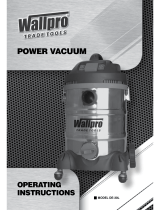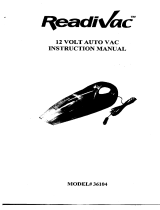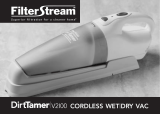
This manual is applicable for -B1 & TW only
Black & Decker Copyright 2005 (MAY–05)
––––––––––––––––––––––––––––––––––––––––––––––––––––––
7.2V Wet & Dey Dustbuster
®
CHV7250
––––––––––––––––––––––––––––––––––––––––––––––––––––––
Technical Data
–––––––––––––––––––––––––––––––––––––––––––––––––––––––––––––––––––––––––––––––––––––––––––––
Dustbuster
®
CHV7250
–––––––––––––––––––––––––––––––––––––––––––––––––––––––––––––––––––––––––––––––––––––––––––––
Voltage V 7.2
–––––––––––––––––––––––––––––––––––––––––––––––––––––––––––––––––––––––––––––––––––––––––––––
Run Time mins. 8-10
––––––––––––––––––––
–––––––––––––––––––––––––––––––––––––––––––––––––––––––––––––––––––––––––
Power (Air Watts) W 15
–––––––––––––––––––––––––––––––––––––––––––––––––––––––––––––––––––––––––––––––––––––––––––––
Maximum Suction Power mm/water 350
–––––––––––––––––––––––––––––––––––––––––––––––––––––––––––––––––––––––––––––––––––––––––––––
Maximum Airflow l/min. 750
–––––––––––––––––––––––––––––––––––––––––––––––––––––––––––––––––––––––––––––––––––––––––––––
Dust bowl capacity ml 207
––––––––––––––––––––––––––––––––––––––––––––––––––––––––––––––––
–––––––––––––––––––––––––––––
Net Weight kg 1.4
–––––––––––––––––––––––––––––––––––––––––––––––––––––––––––––––––––––––––––––––––––––––––––––
Intended Use
Your Black & Decker Dustbuster
®
hand held vacuum cleaner has been designed for light dry & wet vacuum
cleaning purposes. This product is intended for domestic use only.
Warning Symbols
Denotes risk of personal injury, loss of life or damage to the product in case of non-observance of
the instructi
ons in this manual.
Safety Instructions
Warning! When using battery-powered appliances, basic safety precautions, including the following,
should always be followed, to reduce the risk of fire, leaking batteries, personal injury and material damage.
Read this entire manual carefully before using the appliance.
The intended use is described in this manual. The use of any accessory or attachment or the
performance of any operation with this appliance other than those recommended in this instruction
manual may present a risk of personal injury.
Retain this manual for future reference.
Use Your Appliance
Do not place bowl inlet or outlet of your appliance near eyes or ears when operating.
Do not expose your vac to rain.
Do not operate without the filter bag in place. Repair or replace a damaged bag promptly.
Do not overreach. Use extra caution when cleaning on stairs. Keep proper footing and balance at all
times.
Do not vacuum burning or smoking materials, such as lit cigarette butts, matches or hot ashes.
Do not operate p ortable electric tools in a gaseous or explosive atmosphere. Motors in
these tools normally spark, and the sparks may ignite fumes.
Do not use your appliance to pick up toxic substances, flammable or combustible liquids such
as gasoline or use in areas where they may be present.
Do not allow to be used as a toy. Close attention is necessary when used by or near children.
Use only as described in this manual. Use only manufacturer's recommended attachments.
If the appliance is not working as it should, has been dropped, damaged, left outdoors, or dropped into
water, return it to a service center.
Do not put any object into openings. Do not use with any opening blocked; keep free of dust, lint,
hair, and everything that may reduce airflow.
Keep hair, loose clothing, fingers, and all parts of body away from openings and moving parts.
Do not handle charger or appliance with wet hands.
Never pull the charger lead to disconnect the charger from the socket. Keep the charger lead
away from heat, oil and sharp edges.
Do not insert accessories when the unit is running.
Do not vacuum any electrical appliance while they are plugged in.
Do not operate any appliance with a damaged cord or charger or after the appliance
malfunctions, is left outdoors, dropped into water or is damaged in any manner. Return the
appliance to any authorized service facility.
Do not use Dustbuster
®
dry hand vacs outdoors or on wet surfaces. Do not use the wet/dry
hand vacs outdoors.
Do not allow the cord to hang over the edge of a table or counter or touch hot surfaces. The
unit should be placed or mounted away from sinks and hot surfaces.
Do not pick up any sharp objects that may damage vacuum or filter.
Use extra caution when cleaning on stairs.
Inspection and Repairs
Before use, check the appliance for damaged or defective parts. Check for breakage of parts,
damage to switches and any other conditions that may affect its operation. Do not use the appliance if
any part is damaged or defective.
Have any damaged or defective parts repaired or replaced by an authorized repair agent.
Regularly check the charger lead for damage. Replace the charger if the lead is damaged or
defective.
Never attempt to remove or replace any parts other than those specified in this manual.
Maintain your appliance with care. Keep the bowl and fan area clean for best and safest performance.
Follow the instruction for proper maintenance.
Do not attempt to repair your appliance. To assure it's safety and reliability; repairs, maintenance and
adjustments should be performed by Black & Decker authorized repair agents.
Battery and Charger
Never attempt to open the battery or charger.
Do not expose the battery or charger to water.
Do not incinerate the battery.
Leaks from battery cells can occur under extreme conditions. If the liquid, which is a 20-35%
solution of potassium hydroxide, gets on the skin: (a) wash quickly with soap and water; or (b) neutralize
with a mild acid such as lemon juice or vinegar. If the liquid gets into the eyes, flush them immediately with
clean water for a minimum of 10 minutes. Seek medical attention.
Double Insulation
The charger of this appliance is double insulated. Double insulation means that all the external metal
parts are electrically insulated from the mains power supply. This is done by placing insulated
barriers between the electrical and mechanical components so as to making unnecessary for the tool
to be earthed. Note: Double insulation does not take the place of normal safety precautions when operating
this tool. The insulation system is fo
r added protection against injury resulting from a possible electrical
insulation failure within the tool.
Electrical Safety
The electric motor has been designed for one voltage only. Always check that the power supply corresponds
to the voltage on the rating plate. Never attempt to replace the charger unit with a regular mains plug.
Symbols on the Charger
Your charger may contain the following symbols:
Your charge
r is double insulated; therefore no earth wire is required.
Fail safe isolating transformer. The mains supply is electrically separated from the transformer output.
The charger automatically shuts off if the ambient temperature becomes too high. As soon as the
ambient temperature has decressed, the charger will resume operating.
The charger is intended for indoor use only.
Read the manual carefully before using the appli
ance.
Features (Fig. A)
1. On/off switch 5. Charger connector 9. Charger Plug
2. Release button 6. Hanging loop 10. Squeegee
3. Dust bowl 7. Wall hook 11. Crevice tool
4. Bowl inlet 8. Power Supply Plug
Before First Use
Before first use, the battery must be charged for at least 16 hours.
Economic Usage
This appliance is very economical to charge. While it is charging it uses less than half the amount of
electricity used by a light bulb.
When fully charged, the average effective usage times are between 8-10 minutes. But it may take several
chargings before these times can be achieved.
Assembly
Fitting the Accessories (Fig. B & C)
The appliance is supplied with the following accessories and are stored beneath the rear of the appliance (Fig.
B):
a squeegee (10) for wet spills.
a creative tool (11) for confined spaces.
To fit an accessory, proceed as follows (Fig. C):
Take the accessories from the appliance.
Insert the appropriate accessory into the front of the appliance.
You may refit the other accessory by clicking it into the accessory holder.
To refit both accessories:
Slide the crevice tool into the squeegee.
Push the accessories down until they click into place.
Use
Charging the Battery (Fig. A & D)
Before charging, preferably discharge the battery by operating the appliance until the motor stops.
Make sure that the appliance is switched off. The battery will not be charged with the on/off switch
in the on position (Fig. D).
Insert the charger plug (9) into the charger connector (5) on the underside of the appliance (Fig. A).
Plug in the charger. Switch on at the mains.
Leave the appliance to charge for at least 16 hours.
The appliance can be charged while placed on a worktop or hung on the wall using the wall hook
provided (see “Wall Mounting” below).
Whilst charging, the charger may become warm. This is normal and does not indicate a problem.
Important! Connect the appliance to the charger whenever it is not in use. The appliance can be left
connected to the charger indefinitely. It is not possible to “overcharge” the battery cells with the
charger
provided.
Do not charge the battery at ambient temperatures below 4ºC or above 40ºC.
Wall Mounting (Fig. E & F)
CAUTION: Safety glasses should be worn any time a drill is being used. When drilling, take care to avoid
any electrical wiring located behind the wall.
The appliance can be mounted to most walls. Fix the wall hook (7) within reach of an electrical outlet.
Mount securely used appropriate length screws into framing studs or spring type wall anchors into
wallboard, etc.
Ensure cable is not too tight so as to pull unit off wall mount.
Operating the Appliance (Fig. G)
To switch on, slide the on/off switch (1) forward to position I.
Slide the on/off switch backward to position O to turn off the appliance.
Wet Pick-up (Fig. C & H)
For best performance on non-absorbent hard surface wet pickups, insert squeegee (10) into the bowl
inlet (4) (Fig. C).
Hold the appliance at an angle of 45º and pull it slowly towards you.
On absortbent surfaces, such as carpet, your appliance will pick up wet spills better without the accessory.
Do not fill the bowl beyond the end of the intake chute (12) (Fig. H). If there is any liquid in the bowl, do not
turn the unit upside down, sideways, point the nozzle upward, or shake the appliance excessively.
After picking up liquid substances, clean the appliance and filter immediately. Mold and mildew may
form if the unit is not properly cleaned after wet pickups.
Always return the product to the charging base immediately after use so that it will be ready and fully charged
for the next use. Ensure that the product is fully engaged on the power supply plug
.
Maintenance
Filter (Fig. I & J)
We recommend that you replace the filter every 6-9 months and whenever worn or damaged. Replacement
filters (cat. No. VF72) are available at extra cost from your local dealer.
Unplug the vacuum.
Press the release button (2) and remove the dust bowl (3) (Fig. I). Remove the filters (13 & 14).
To refit the filters, place the soft filter (13) into the hard filter (14) (fig. J).
Refit the dust bowl onto the appliance. Make sure the dust bowl clicks into place (Fig. I).
Caution: The use of any non-recommended accessories may be hazardous.
Cleaning (Fig. I, K, L & M)
Note: The filter is re-usable, do not confuse them with disposable dust bags, and do not throw them away
when the product is emptied.
Important: Maximum dust collection will only be obtained with clean filter and an empty dust bowl.
If dust
begins to fall back out of the product after it is switched off, this indicates that the bowl is full and requires
emptying.
Unplug the vacuum before cleaning.
Press the release button (2) and remove the dust bowl (3) (Fig. I).
While holding the bowl over a wastebasket, pull out hard filter and foam filter to remove. Empty the dust
bowl and wash if necessary (Fig. K & L).
Wash the filter regularly using warm, soapy water (Fig. L) and ensure that it is completely dry before using
it again. The cleaner the filter are, the better the product will perform. It is very important that the filter is
correctly in position before use. The dust bowl can also be washed in warm soapy water. Ensure that it is
dry before re-attaching.
Never immerse the product in water. A damp cloth and soapy water should be used to clean the exterior
of the motor section. Always ensure the product is completely dry before re-use or storing (Fig. M).
Important
To ensure product SAFETY and RELIABILITY, repairs, maintenance and adjustment (other than those listed in
this manual) should be performed by authorized service centers or other qualified organization
s, always using
identical replacement parts. Unit contains no user serviceable parts inside.
Trouble Shooting Guide
If the product does not work, check the following:
The power supply plug was correctly plugged in for recharge (it feels slightly warm to the touch).
The power supply plug is not damaged and is correctly attached to the appliance.
The power supply plug into a working electrical outlet.
Rechargeable Batteries And The Environment
Rechargeable Batteries (Fig. N-O)
This product uses nickel-cadmium (NiCd) rechargeable and recyclable batteries, which can be charged
many times to give long life and repeatedly full power.
This symbol indicates the NiCd batteries contained within this unit must be disposed of properly and
not discarded in everyday househol
d waste, which may be disposed of in an incinerator or landfill site.
NiCd batteries can be harmful to the environment and can explode when exposed to fire. Do NOT incinerate
or composted.
Please think of the protection of our environment. Therefore, when the batteries no longer hold a charge, they
should be removed from the appliance and recycled.
If you want to dispose of the product yourself, the battery must be remov
ed as described below and disposed
of in accordance with local regulations. N.B. Once removed, the battery pack cannot be refitted.
Preferably discharge the battery by operating the appliance until the motor stops.
Remove the dust bowl (3).
Using a flat-blade screwdriver (not supplied), push the battery cover (15) in at the notch above the charger
connector (5), so that it unclips and can be removed (Fig. N).
Take hold of the battery casing to pull the battery out of the appliance (Fig. O).
Place the battery in suitable packaging to ensure that the terminals cannot be short-circuited.
Take the battery pack to your local recycling station. If necessary, contact your local municipality for
proper disposal instructions in your city/town. The collected batteries will be disposed of properly
and/or used for recycling purposes whilst protecting the environment.
Note: you as a customer are responsible for proper disposal or recycling of the battery pack.
Unwanted Appliance
Should you find one day that your appliance needs replacement, or if it is of no further use to you,
think of the protection of the environment. Black & Decker recommends you to contact your local
council for disposal information.
Service Information
Black & Decker offers a full network of company-owned and authorized service locations throughout Asia.
All Black & Decker Service Centers are staffed with trained personnel to provide customers with efficient
and re
liable power tool service.
Whether you need technical advice, repair, or genuine factory replacement parts, contact the Black & Decker
location nearest to you.
Notes
Black & Decker's policy is one of continuous improvement to our products and, as such, we reserve the
right to change product specifications without prior notice.
Standard equipment and accessories may vary by country.
Product specifications may differ by country.
Complete product range may not be available in all countries. Contact your local Black & Decker dealers
for range availability
––––––––––––––––––––––––––––––––––––––––––––––––––––––
Dustbuster
®
CHV7250
––––––––––––––––––––––––––––––––––––––––––––––––––––––
–––––––––––––––––––––––––––––––––––––––––––––––––––––––––––––––––––––––––––––––––––––––
Dustbuster
®
CHV7250
–––––––––––––––––––––––––––––––––––––––––––––––––––––––––––––––––––––––––––––––––––––––
7.2
–––––––––––––––––––––––––––––––––––––––––––––––––––––––––––––––––––––––––––––––––––––––
8-10
–––––––––––––––––––––––––––––––––––––––––––––––––––––––––––––––––––––––––––––––––––––––
15
–––––––––––––––––––––––––––––––––––––––––––––––––––––––––––––––––––––––––––––––––––––––
350
–––––––––––––––––––––––––––––––––––––––––––––––––––––––––––––––––––––––––––––––––––––––
750
–––––––––––––––––––––––––––––––––––––––––––––––––––––––––––––––––––––––––––––––––––––––
207
–––––––––––––––––––––––––––––––––––––––––––––––––––––––––––––––––––––––––––––––––––––––
1.4
–––––––––––––––––––––––––––––––––––––––––––––––––––––––––––––––––––––––––––––––––––––––
25-30%
A
1. 5. 9.
2. 6. 10.
3. 7. 11.
4. 8.
8–10
B C
B
CHV7250
90581828

(
10
)
(
11
)
C
(
4
)
A D
D
(
9
) (
5
)
4ºC
E F
(
7
)
G
I
0
C H
I
(
10
) (
4
)
C
45º
(
10
)
(
12
)
H
I J
VF72
(
2
) (
3
)
I
(
13
14
)
J
(
13
) (
14
)
J
I
I, K, L M
(
2
) (
3
)
I
(
3
)
K
L
F
M
N-O
(
NiCd
)
(
3
)
(
5
) (
15
)
N
O
-
 1
1
-
 2
2
BLACK+DECKER CHV7250 User manual
- Type
- User manual
- This manual is also suitable for
Ask a question and I''ll find the answer in the document
Finding information in a document is now easier with AI
Related papers
-
Black & Decker 90529151 User manual
-
Black & Decker Dustbuster V4800 User manual
-
BLACK+DECKER WDB115WA User manual
-
Black & Decker NW3660 User manual
-
BLACK+DECKER WDC215WA User manual
-
Black & Decker FV7201K User manual
-
Black & Decker WDC215WA User manual
-
Black & Decker NVB115JM User manual
-
BLACK+DECKER NW4820N Wet/Dry Dustbuster Vacuum Cleaner User manual
-
Black & Decker NVB115J User manual
Other documents
-
Black & Decker WD7201W User manual
-
BLACK DECKER CWV1408 User manual
-
Black & Decker WD7201O User manual
-
Ryobi P710 User manual
-
United VC-8129 Operating instructions
-
Ryobi VC180 User manual
-
 Wallpro DE-30L Operating Instructions Manual
Wallpro DE-30L Operating Instructions Manual
-
Electrolux ZB266X User manual
-
 ReadiVac 36104RGB User guide
ReadiVac 36104RGB User guide
-
 FilterStream DirtTamer V2100 User manual
FilterStream DirtTamer V2100 User manual




